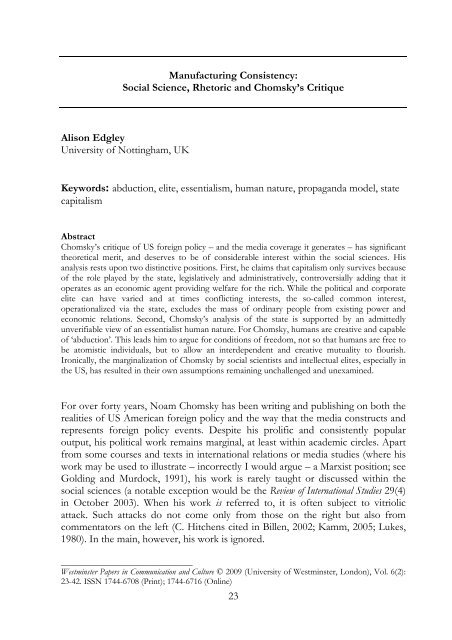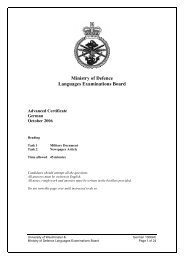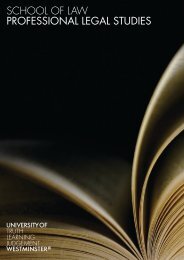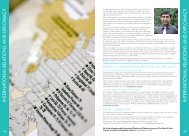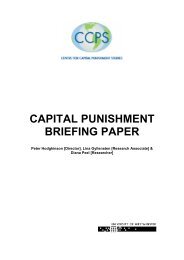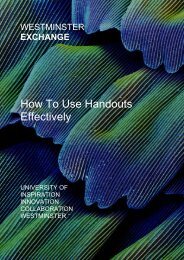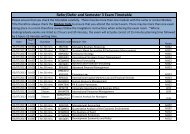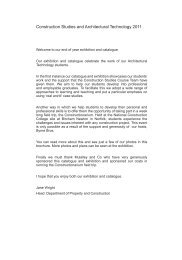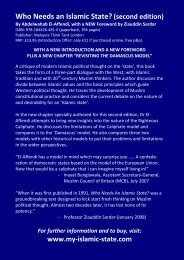Social Science, Rhetoric and Chomsky's Critique - Alison Edgley
Social Science, Rhetoric and Chomsky's Critique - Alison Edgley
Social Science, Rhetoric and Chomsky's Critique - Alison Edgley
Create successful ePaper yourself
Turn your PDF publications into a flip-book with our unique Google optimized e-Paper software.
Manufacturing Consistency:<strong>Social</strong> <strong>Science</strong>, <strong>Rhetoric</strong> <strong>and</strong> Chomsky’s <strong>Critique</strong><strong>Alison</strong> <strong>Edgley</strong>University of Nottingham, UKKeywords: abduction, elite, essentialism, human nature, propag<strong>and</strong>a model, statecapitalismAbstractChomsky’s critique of US foreign policy – <strong>and</strong> the media coverage it generates – has significanttheoretical merit, <strong>and</strong> deserves to be of considerable interest within the social sciences. Hisanalysis rests upon two distinctive positions. First, he claims that capitalism only survives becauseof the role played by the state, legislatively <strong>and</strong> administratively, controversially adding that itoperates as an economic agent providing welfare for the rich. While the political <strong>and</strong> corporateelite can have varied <strong>and</strong> at times conflicting interests, the so-called common interest,operationalized via the state, excludes the mass of ordinary people from existing power <strong>and</strong>economic relations. Second, Chomsky’s analysis of the state is supported by an admittedlyunverifiable view of an essentialist human nature. For Chomsky, humans are creative <strong>and</strong> capableof ‘abduction’. This leads him to argue for conditions of freedom, not so that humans are free tobe atomistic individuals, but to allow an interdependent <strong>and</strong> creative mutuality to flourish.Ironically, the marginalization of Chomsky by social scientists <strong>and</strong> intellectual elites, especially inthe US, has resulted in their own assumptions remaining unchallenged <strong>and</strong> unexamined.For over forty years, Noam Chomsky has been writing <strong>and</strong> publishing on both therealities of US American foreign policy <strong>and</strong> the way that the media constructs <strong>and</strong>represents foreign policy events. Despite his prolific <strong>and</strong> consistently popularoutput, his political work remains marginal, at least within academic circles. Apartfrom some courses <strong>and</strong> texts in international relations or media studies (where hiswork may be used to illustrate – incorrectly I would argue – a Marxist position; seeGolding <strong>and</strong> Murdock, 1991), his work is rarely taught or discussed within thesocial sciences (a notable exception would be the Review of International Studies 29(4)in October 2003). When his work is referred to, it is often subject to vitriolicattack. Such attacks do not come only from those on the right but also fromcommentators on the left (C. Hitchens cited in Billen, 2002; Kamm, 2005; Lukes,1980). In the main, however, his work is ignored.______________________________Westminster Papers in Communication <strong>and</strong> Culture © 2009 (University of Westminster, London), Vol. 6(2):23-42. ISSN 1744-6708 (Print); 1744-6716 (Online)23
Westminster Papers in Communication <strong>and</strong> Culture 6(2)Herring <strong>and</strong> Robinson (2003) demonstrate that getting reviewers <strong>and</strong> editors totake Chomsky’s work seriously is enormously difficult. They note that the excuseoften given is that Chomsky’s work is polemical <strong>and</strong> therefore of little academicmerit. In examining this claim, however, they were unable to uncover a singleacademic study showing that his work is merely a polemic. Instead they suggestthat particular terms such as ‘the propag<strong>and</strong>a model’ are taken as sufficientevidence of the polemical nature of Chomsky’s work, concluding that academiahas become disciplined to exclude anti-elite analysis, an indication of both theexistence <strong>and</strong> operation of that very propag<strong>and</strong>a model. As such, Chomsky’s workis not even read to be rejected, rather ‘it is simply made incomprehensible orinvisible by ideology due to their [Herman’s <strong>and</strong> Chomsky’s] conception of anintegrated political <strong>and</strong> corporate elite’ (ibid., 566). In other words, the notion thatthose in political <strong>and</strong> corporate power comprise a single elite capable of beingresearched as a social entity with shared beliefs <strong>and</strong> interests is dismissed out ofh<strong>and</strong>, without recourse to any of the st<strong>and</strong>ard logical, theoretical or evidential testsavailable to the practising social scientist.This article argues that this feature of Chomsky’s work represents a distinctivecontribution that is at the very least worthy of debate within the social sciences. Inorder to demonstrate this, two theoretical positions taken by Chomsky will bemade explicit. On this basis, we can, in part at least, explain both some of the heathe evokes within his critics <strong>and</strong> the marginalization of his work that is so evidentwithin the social sciences. These two positions are also crucial to an underst<strong>and</strong>ingof the ‘propag<strong>and</strong>a model’ articulated by Chomsky <strong>and</strong> Herman. The twopositions to be discussed are Chomsky’s position on the state <strong>and</strong> his account ofhuman nature.The Role of the State in Chomsky’s Analysis<strong>Social</strong> science offers many ways to underst<strong>and</strong> social reality, each one of whichinvites us to adopt a set of assumptions about what counts. This is no more sothan in the case of the meaning of the state. Unquestionably, there has beenconsiderable debate about whether the state can be said to be ‘real’ or not.Beneath these discourses, or battles about surface reality, an implicit <strong>and</strong> untestedassumption can often be found that the contemporary state, admittedly at timesflawed in practice or subject to being ideologically hijacked, is fundamentallyprogressive <strong>and</strong> rational as a form of social organization. In its democratic form, itis assumed to be an enlightened form of social organization necessary for ensuringsystems of governance that are universally <strong>and</strong> equitably applicable while at thesame time representative of some estimate of majority interest. While the means<strong>and</strong> ends of the state in governance terms are vigorously debated, the state as theform by which to organize the national interest is not.24
<strong>Edgley</strong>, Manufacturing Consistency...Among the harshest critics of contemporary capitalist state forms are those whodraw on Marx’s intellectual legacy. In The Communist Manifesto, Marx <strong>and</strong> Engels(1935 [1848]) make the claim that ‘the executive of the modern state is but acommittee for managing the common affairs of the whole bourgeoisie’ (quoted inMcLellan 1977, 223)). The debate between Milib<strong>and</strong> (1973) <strong>and</strong> Poulantzas (1973)concerned whether it is the logic of capital or the nature of class composition thatdetermines the nature of, or more specifically the autonomy of the state in the firstor last instance. The implication within a Marxist framework is that the state’s roleis at once judicial, ideological <strong>and</strong> coercive. For, as Maguire (1978) <strong>and</strong> Skillen(1972) point out, Marx assumes the capitalist economy is self-regulatory <strong>and</strong>‘autonomous’. As such, the Marxist conception of the state is one of distortion bycapitalism, leaving the question of whether this is because of instrumentalismwithin the bourgeoisie or determination by the momentum of capitalism open todebate. So, while the state under capitalism is perceived as partisan, withoutcapitalism an alternative version of the state becomes possible. Indeed, Marx callsfor the working class to capture the state, in order that it may better reflect <strong>and</strong> actupon the true interests of the working class <strong>and</strong> thus humankind. Even within theMarxist critique, therefore, we see an account of the state as potentiallyprogressive.Reading Chomsky against the Marxist account <strong>and</strong> critique of the capitalist statewe see his preference for an alternative <strong>and</strong> distinctive account of the modernstate. For Chomsky, the state’s role is to protect <strong>and</strong> exp<strong>and</strong> the interests of therich <strong>and</strong> powerful while at the same time controlling the ‘rascal multitude’ (a termemployed by <strong>and</strong> representative of the elite’s view of ordinary people; seeChomsky, 1992, 367) – always liable to offend against good order, <strong>and</strong> especiallyproperty. As Chomsky sees it, controlling the domestic population is not just aproblem, but the ‘central one facing any state or other system of power’ (ibid., 59).‘To those in power, it seems obvious that the population must be cajoled <strong>and</strong>manipulated, frightened <strong>and</strong> kept in ignorance, so that ruling elites can operatewithout hindrance to the “national interest” as they choose to define it’ (Chomsky,1973, 18). For Chomsky, the rich <strong>and</strong> powerful are those with business interests aswell as those in positions of political power. To demonstrate the symbioticrelationship between these elites, he regularly refers to the ‘state corporate nexus’(Chomsky, 1993). Where Chomsky parts company with a Marxist interpretation ofthe state’s role is with his assertion that free market capitalism is dead. He argues,‘take note of the broad – if tacit – underst<strong>and</strong>ing that the capitalist model haslimited application; business leaders have long recognised it is not for them’(Chomsky, 1992, 144). Chomsky’s point is that the business community is, to alarge extent, dependent upon not just the legislative support of the state but also,<strong>and</strong> critically, its economic support. ‘Business circles have long taken for grantedthat the state must play a major role in maintaining the system of private profit’25
Westminster Papers in Communication <strong>and</strong> Culture 6(2)(ibid., 108, emphasis added). Business, he argues, has to be induced to invest, <strong>and</strong>the best inducement is a guaranteed market <strong>and</strong>/or public subsidy of research <strong>and</strong>development. In respect of the US economy, Chomsky argues that the only partsthat are competitive are those that depend either on a guaranteed market or publicsubsidy: advanced technology, capital intensive agriculture <strong>and</strong> pharmaceuticals.The military industrial complex, Eisenhower’s principal concern, or ‘militaryKeynsianism’ as Chomsky calls it, keeps a form of capitalism alive, involving as itdoes public subsidy for private profit, which can more accurately be described aswelfare for the rich. The state not only provides the legislative conditions for acapitalist economy, but it is also itself a major economic agent.Chomsky, following Humboldt (1969 [1792]) <strong>and</strong> Rocker (1937), but in starkcontrast to Marx, argues that it is not historical materialism that accounts for thedevelopment of capitalist relations of production. Rather it is the effect ofcentralized state power on the forces of production that accounts for thedevelopment <strong>and</strong> maintenance of capitalism. Rocker is deeply critical of the viewsubscribed to by the historical materialist version of history that connects the riseof the national state with necessary progress. Indeed, in a discussion of thedevelopment of European industry, Rocker talks of ‘unbridled favouritism …convert[ing] entire industrial lines into monopolies’ (ibid., 116). In other words,capitalism was not an outcome of the development of the productive forces butan outcome of the impact of centralized power on productive forces. Chomsky,referring to the formation of the Dutch East India Company, argues that:… [i]n highly simplified form, we see already something of the structure of themodern political economy dominated by a network of transnational financial<strong>and</strong> industrial institutions with internally managed investment <strong>and</strong> trade, theirwealth <strong>and</strong> influence established <strong>and</strong> maintained by the state power that theymobilize <strong>and</strong> largely control. (ibid., 6, emphasis added)According to Rocker <strong>and</strong> Chomsky, were it not for concentrated state power,capitalism would not have been possible – nor would it survive. This is to st<strong>and</strong> aMarxist adage on its head: destroy the state <strong>and</strong> it is capitalism which will ‘witheraway’.The state, then, is never a more or less effective arbiter of competing interests.Nor is it merely a reflection of determining economic forces. Rather, it providesthe legislative conditions <strong>and</strong> coercive authority for a capitalist economy to exist,<strong>and</strong> it is itself a significant economic actor. The ‘hidden h<strong>and</strong>’ exists all right, but itis attached to <strong>and</strong> manipulated by the state.Unsurprisingly, this type of critique of the state in terms of the relationshipbetween economic <strong>and</strong> political elites, <strong>and</strong> the structural relationship between26
<strong>Edgley</strong>, Manufacturing Consistency...contemporary capitalism <strong>and</strong> the state, has attracted a great number of adherentssince the collapse <strong>and</strong> bail-out of the US banking <strong>and</strong> finance sector. Moreover,the supposedly expert financial media failed to challenge <strong>and</strong> expose the activitiesof the finance sector <strong>and</strong> did not predict a collapse which is now seen asinevitable. The media were, instead, complicit. Evidence has come to the supportof both the theory <strong>and</strong> the propag<strong>and</strong>a model, but their most consistentproponent remains unacknowledged.The role of the state in the United States, as Chomsky underst<strong>and</strong>s it, is notmerely a domestic matter. As business interests derive from the need capital has toinvest abroad, the state will also operate to ensure that less developed countrieskeep their doors open to foreign investment. As such, the state is not onlyconcerned to control its own population, but it is also concerned with controllingthe populations <strong>and</strong> states of less well developed countries. This relationshipbetween the state <strong>and</strong> business is the source of, the driving force behind, theconstituent elements of American foreign policy.The USA, Chomsky openly acknowledges, ‘is a free society, much more so thanany other’ (1993, 182). This same state seeks, by whatever means, to secure theinterests of American business to ensure secure access to markets, cheapresources, <strong>and</strong> labour <strong>and</strong> investment opportunities for US capital in all countries.The process is not always smooth <strong>and</strong> seamless, particularly in less developedcountries. In some instances an unsuitable elite is democratically elected (Chile), ora nation attempts some form of independent development (Nicaragua), or a localelite begins to compromise American interests (Panama). In such cases, Americahas ruthlessly deployed a variety of responses: economic sanctions (Cuba); a CIAcoup (e.g. Chile in 1973); cl<strong>and</strong>estine <strong>and</strong> illegal funding of contras to terrorize <strong>and</strong>destabilize development (in Nicaragua in the 1980s); or direct invasion (Panama in1989). Chomsky <strong>and</strong> Herman (1979), in a close analysis of US aid, even found thatwhen the proportion of aid increases, so too does the level of human rightsabuses.On the basis of this kind of evidence, the critique of the elite-dominated state, <strong>and</strong>its relationship to capitalist development <strong>and</strong> the protection <strong>and</strong> sponsorship of itsinterests, animates Chomsky’s analysis of the construction, purpose <strong>and</strong> use of USAmerican foreign policy. It is the discomfort caused by his consistent use of thistheoretical lens to assess <strong>and</strong> critique the state <strong>and</strong> its actions that, to my mind,accounts for many over-heated attacks on his work.Apart from those simply making ad hominem attacks that he is an anti-Semitic Jew,most of his critics are US-based – they become apoplectic when Chomsky likensaspects of US state activity to that of Nazi Germany (where the link between theinterests of the political <strong>and</strong> industrial elites was also evident) or terrorism (where27
Westminster Papers in Communication <strong>and</strong> Culture 6(2)there are no limits to the violence that might be perpetrated against a people or acountry). The idea that their own ‘liberal democratic’ state could possibly bedescribed as terrorist or Nazi-like is just inconceivable. As a result, many of hiscritics respond by being personally offended <strong>and</strong> thus miss the challenge to theirown assumptions in his criticisms. Chomsky points out that ‘most people are notgangsters <strong>and</strong> agree it was wrong to steal food from starving children’ (1988a,303), even though this is what happens, sometimes on a massive scale, under theguise of American foreign policy. For most, it is unthinkable that this could behappening, whatever the evidence. For them, ‘it should not be true’, comes tomean that it could never be the case. They are supported in their preferred, morecomforting <strong>and</strong> alternative view of a worthy, if sometimes misguided state, by the‘propag<strong>and</strong>a model’, relentlessly presenting a just <strong>and</strong> law-abiding state, doing nomore than protecting its legitimate interests in sometimes difficult circumstances.Theoretically <strong>and</strong> practically, it is Chomsky’s account of the state – not capitalism– with its capacity to concentrate unaccountable <strong>and</strong> exploitative economic <strong>and</strong>power relations, <strong>and</strong> bias them towards particular or general property interests,which animates <strong>and</strong> underpins the propag<strong>and</strong>a model. For this reason, Chomskyargues that the state is the root cause of social injustice. Under the propag<strong>and</strong>amodel the media ‘serve <strong>and</strong> propag<strong>and</strong>ize on behalf of, the powerful societalinterests that control <strong>and</strong> finance them’ (Herman <strong>and</strong> Chomsky, 2002 [1979,1988], xi). Those critics who cannot countenance the idea that the US state isbehaving in a way that is ‘reminiscent of’ or ‘similar to’ imperial ambitions of Naziproportions are implicitly operating from the perspective that the Western stateform is democratic in nature, <strong>and</strong> therefore fundamentally well-meaning <strong>and</strong>progressive, <strong>and</strong> that the gloss it puts on its self-serving actions is truth, notpropag<strong>and</strong>a.The significance of Chomsky’s emphasis not being on the forces of historicalmaterialism but on highlighting <strong>and</strong> exploring the powers of the state signals afurther important aspect of his theoretical perspective. States are consciouslyorganized bodies of elites. In other words, it is agents, actual individuals who arein control, not social or historical forces. If individuals are in control (not somelogic of capital, or a socially determined group, or an historical dynamic) thenthese individuals have choices. Conceivably, individuals with choices can behavedifferently, <strong>and</strong> the individuals he has in mind (American/Western) do, after all,live in a ‘free society’.Agency is crucial to Chomsky’s <strong>and</strong>, I would argue, any analysis of social <strong>and</strong>political organization, making it inappropriate to reify any socio-economicprocesses. Where many thinkers dismiss this as a simplistic <strong>and</strong> instrumentalistview of elite power in operation, Chomsky offers a sophisticated yet clear-cutaccount. In so doing, he also leads us away from the attractions of conspiracy28
<strong>Edgley</strong>, Manufacturing Consistency...theories, which depict agents as ‘evil bastards in a smoke-filled room’ (withoutdenying that conspiracies do occur, vide Alford, 2007; Alford <strong>and</strong> Graham, 2009).These state <strong>and</strong> corporate elites cannot operate in purely instrumental terms. Theycoalesce <strong>and</strong> consolidate their power around national state forms, <strong>and</strong> thesenational state forms compete within <strong>and</strong> between each other for economic <strong>and</strong>political power. As such, they operate within a structural context of international<strong>and</strong> national competition. While on the one h<strong>and</strong> elites do their best tomanipulate, entrench or exp<strong>and</strong> their power, outcomes are constantly in flux,shifting both nationally <strong>and</strong> internationally.The only instrumental certainty is the need for elites to ensure that ‘the bewilderedherd’ remain no more than ‘observers’, rather than ‘participants’ (Chomsky, 1992,370). The structure (of national states in competition) may well have a role to playin maintaining the madness, but it could be different. To explain why there is nottoo much cognitive dissonance between actions <strong>and</strong> beliefs among elites, soensuring that public opinion can be appropriately managed, Chomsky withHerman developed the propag<strong>and</strong>a model. This model observes that media <strong>and</strong>academic elites also have roles in maintaining the fiction that the state isfundamentally democratic <strong>and</strong> progressive. The media consistently fails to holdthe state to account for its actions, while much social science research incorporatesruling assumptions <strong>and</strong> thus fails to live up to its own claims to objectivity.These elements of Chomsky’s way of underst<strong>and</strong>ing the political world heexamines amount to a theory, complete with internal coherence, the capacity toformulate <strong>and</strong> test hypotheses, <strong>and</strong> the ability to interrogate evidence <strong>and</strong> reachconclusions (<strong>Edgley</strong>, 2000). It is a reflexive, rather than a closed system, <strong>and</strong> it canbe <strong>and</strong> has been applied successfully across time <strong>and</strong> in respect of different polities<strong>and</strong> contingencies.So what? My first observation is that Chomsky’s approach has two unusualfeatures in terms of modern social science. Unlike many approaches, it has notbecome highly specialized, with its own arcane <strong>and</strong> self-referential language,splinter groups <strong>and</strong> a dedicated journal catering to a few thous<strong>and</strong> adherents. Itake this to be a good sign. Second, Chomsky’s approach retains its connectionwith its subject matter, <strong>and</strong> in so doing testifies to the need for multiple,complementary <strong>and</strong> concurrent investigations into national <strong>and</strong> internationalactions <strong>and</strong> elite behaviour in the political, governmental, military, economic <strong>and</strong>media fields. What other forms of study are doing this in a systematic way?This brings me back to my initial point about Chomsky’s wider contribution forthe social sciences. His theoretical account claims that the way that state formscoalesce power <strong>and</strong> generate outcomes can never be fully representative ofordinary people’s interests, but rather can only serve elite interests. This powerful29
Westminster Papers in Communication <strong>and</strong> Culture 6(2)claim is in contrast to much published social science – most of which happens tobe funded by the state <strong>and</strong> is increasingly subject to audit <strong>and</strong> evaluation for‘quality’ by that same state – where there is an implicit assumption that thedemocratic state, while periodically infected by bad apples, unfortunate events <strong>and</strong>limits to governability, is unquestionably essential to the healthy functioning ofcontemporary society. Consider the contemporary development: the state hasbecome the lead champion <strong>and</strong> funder of ‘the knowledge society’. These arematters beyond the usual range of political argument, located as they so often arewithin the constraints of the accepted ideological positions (all of which are prostate).Nevertheless, political disputation sometimes brings about slippage in theboundaries of underst<strong>and</strong>ing. For example, Chomsky at times praises Republicansor right-wingers for at least being more honest than Democrats in their analysis ofevents, because they more c<strong>and</strong>idly operate from the position that the ‘rabble’require elite guidance to help them to see what is good for them. Not for them theveneer of democratic legitimation of all power.The Role of Human Nature in Chomsky’s AnalysisThe second distinctive theoretical position held by Chomsky in respect of thesocial sciences concerns his views on human nature. It is fair to say that muchsocial science thinking adopts the working assumption that agency is highlyinfluenced (but not entirely determined) by social structures. Society matters.Positions which appear to embody any form of essentialism are usually subject tothe apparently damning criticism that they are deeply conservative or reactionaryin the way that they are said to justify existing social relations. From anotherperspective entirely, the essentialism associated with some radical feminists isdeemed unpalatable because they espouse views which are ahistorical,homogenizing <strong>and</strong> biologically determinist (Jagger, 1988). For those concernedwith substantive social justice, there are two options. One is the view that onlydramatic change at the level of economic structures could bring about any hope ofpositive change in key social structures, which in turn would encourage thegeneration of a human <strong>and</strong> social agency motivated less by autonomy <strong>and</strong> selfinterest<strong>and</strong> more, but not exclusively, by collective <strong>and</strong> social concerns. Thealternative is a series of incentive-shifting <strong>and</strong> behaviour-modifying legal <strong>and</strong> socialchanges, which, to have any purchase, must be carefully planned, sanctioned <strong>and</strong>implemented by the state. For most social scientists, then, humans cannot do it ontheir own. Why not? It’s human nature.Chomsky (1988a), unlike many contemporary social <strong>and</strong> political commentators,openly states that his analysis is dependent upon an essentialist version of humannature. He is open about his beliefs <strong>and</strong> preferences on this subject, <strong>and</strong> his30
<strong>Edgley</strong>, Manufacturing Consistency...argument that all social <strong>and</strong> political analysis must rest upon a version of humannature (even if its existence is denied, or treated as though it were infinitelymalleable) is well-observed (Forbes, 1983).For someone dismissed so readily as a polemicist, it is interesting to note thatChomsky makes no claim to be right about his own view, even though that view isso central to his approach. Rather, he insists that his version of human nature (likeall others) is likely to remain unverifiable. This is both a logical point – we cannever know what may be discovered next about our own humanity, so cannotassert that current ‘knowledge’ about human nature is true – <strong>and</strong> a social scientificone – our nature (essential or otherwise) plays itself out in complex <strong>and</strong> changingconditions not entirely of our own making <strong>and</strong> is only somewhat amenable to ourunderst<strong>and</strong>ing <strong>and</strong> codification.Some of the disagreements between Chomsky <strong>and</strong> his critics about social <strong>and</strong>political realities, <strong>and</strong> how best to organize society, fail to resolve themselvesbecause the different perspectives derive from very different conceptions ofhuman nature. In other words, where the appeal to specific accounts of humannature is crucial but not made explicit, Chomsky <strong>and</strong> his critics can end up talkingpast one another. For this, Chomsky cannot be held responsible, <strong>and</strong> his workdismissed. At least Chomsky has demonstrated that he is aware of howfundamental a view of human nature can be to political argument <strong>and</strong> our view ofwhat ought to happen:Suppose you have an opinion about what ought to be done. We think there hasto be some revolutionary change. Anyone that advocates that kind of position atthe root is basing the advocacy on some assumption about human nature.Maybe the assumption is not explicit, in fact, it almost never is explicit. But thefact is that if there is any moral character to what we advocate, it is because webelieve or are hoping that this change we are proposing is better for humansbecause of the way humans are. There is something about the way humansfundamentally are, about their fundamental nature, which requires that thischange we are advocating take place. (1988a, 597)If Chomsky were the only critic, the only social scientist employing assumptionsabout human nature as a key element in his work, then his critics, <strong>and</strong> the socialscientists who dismiss him out of h<strong>and</strong> would have a strong case. The way thatChomsky makes his assumptions clear, <strong>and</strong> at the same time accepts theunverifiability of any assumptions about human nature, requires that his criticsreveal their founding assumptions <strong>and</strong> explain why <strong>and</strong> how they trumpChomsky’s.This exploration of some of the theoretical aspects of his work establishes a strongcase for rejecting the claims that Chomsky is merely a polemicist, <strong>and</strong> not31
Westminster Papers in Communication <strong>and</strong> Culture 6(2)deserving of attention by the serious academic community (none of whom,presumably, could ever be faulted for any lapse in ‘objectivity’). However, there ismore to Chomsky’s approach than a strong <strong>and</strong> coherent theoretical base.Chomsky himself prefers to be judged by what he does, that is, the products of hispractical methods of investigation.In this respect, Chomsky’s method is deceptively <strong>and</strong>, it turns out, devastatinglysimple. His preferred method for illuminating <strong>and</strong> analysing social <strong>and</strong> politicalaffairs is to look at claimed policy intentions – as published by the state – <strong>and</strong>compare them with policy outcomes – also published by the state. This‘knowledge’ or data is not mediated through any other agency. It is a directcomparison between what the state claimed it was going to achieve, <strong>and</strong> the state’sversion of what it did achieve. It is important to note that, in general, there is asignificant time lapse between the publication of policy intentions <strong>and</strong> policyoutcomes. The media responds in the moment, <strong>and</strong> will discuss at length policyintentions, but rarely revisits those opinions in the light of subsequent evidence.This approach reflects the practice of a critical audit, <strong>and</strong> is conducted so as tointerrogate the truth of intentions <strong>and</strong> against the truth of outcomes. Chomsky isnot to be criticized if his examination exposes contradictions within the elite’s ownaccount of itself. He observes closely the strategy that elites employ. He notes thatthey often couch their policy initiatives in terms of some sort of moral framework,suggesting or privileging a particular account of human nature. Chomsky then setsout to demonstrate the disparity between their purported morality <strong>and</strong> theoutcome of policies. Chomsky used this strategy to good effect on a number ofoccasions in relation to the Vietnam War, contrasting for example the noble,humanitarian intention of protecting a population with the actual practice ofmassive bombardment, which could only jeopardize human life <strong>and</strong> contradict theapparent humanitarian intent.The tactic of massive bombardment must be labelled ‘counterproductive’ inPentagonese, <strong>and</strong> can be attributed only to advanced cretinism, if the UnitedStates goal had been to restrict American casualties or to win popular supportfor the Saigon government or to ‘protect the population.’ But it is quite rationalas a device for demolishing the society in which a rebellion is rooted <strong>and</strong> takesrefuge. (Chomsky, 1973, 78)The above quotation shows that Chomsky does not criticize the capacity orintelligence of the individuals making these policy choices <strong>and</strong> pronouncements.Rather, he assumes that there must be some use or reason, <strong>and</strong> that what thepolicy outcome actually achieved was in the context of an aim which could not bestated in public. In this way, Chomsky does two things. First, he makes it possibleto ask questions about the relationship between policy pronouncements <strong>and</strong> policy32
<strong>Edgley</strong>, Manufacturing Consistency...outcomes, <strong>and</strong> excavates the play of an alternative set of moral values, values thatare rational within an elitist version of human wants.This approach may also contribute to an underst<strong>and</strong>ing of the fury that Chomskyarouses. After all, his method is sound but not unique. It is the same method usedby the many historians <strong>and</strong> social scientists doing archive research, for example.They also routinely reveal the hypocrisy <strong>and</strong> expose the perfidy of states,governments <strong>and</strong> political actors. To live in a polity is to accept that there is noperfect government, so what makes Chomsky’s work annoying to so many (US)defenders of the US state <strong>and</strong> its constituent elites? Chomsky does more thanpresent a different version of the truth. His is a more chastening, a moreembarrassing insight, namely, that the defenders of US foreign policy have time<strong>and</strong> time again apparently been duped into believing the polemical <strong>and</strong> misleadingstatements <strong>and</strong> policy justifications that have so regularly <strong>and</strong> consistently comefrom US state departments, <strong>and</strong> time <strong>and</strong> time again subsequent developmentshave shown how wrong they were to accept them at face value.As Nietzsche so aptly remarked: ‘I have done that’, says my memory. ‘I cannothave done that,’ says my pride, <strong>and</strong> remains inexorable. Eventually – memoryyields. (1968 [1886], 68)Another criticism levelled at Chomsky is that he is unconstructively critical, that hehas no valid way of improving upon the best <strong>and</strong> most free society in the worldthat is the United States. This brings us to the positive aspects of Chomsky’stheoretical position. Although a powerful view, rigorously constructed, it reflectsintellectually both humility <strong>and</strong> modesty.Consistent with the features of his theory outlined above, Chomsky’s view of thegood society is rooted in his assumptions about human nature. For him, ourhuman nature involves a quest for liberty, not in the liberal sense of individualsbeing autonomous <strong>and</strong> atomistic, but rather because the fundamentalcharacteristic of human nature is one of creativity. However, our creativecapacities not only dem<strong>and</strong> liberty, but also the possibility of cooperative,interdependent mutuality (<strong>Edgley</strong>, 2000). In other words, for the full expression ofhuman creativity we need freedom <strong>and</strong> community.I would like to believe that people have an instinct for freedom, that they reallywant to control their own affairs. They don’t want to be pushed around,ordered, oppressed, etc., <strong>and</strong> they want a chance to do things that make sense,like constructive work in a way that they control, or maybe control together withothers. (Chomsky, 1988a, 756)33
Westminster Papers in Communication <strong>and</strong> Culture 6(2)Note here his words: ‘I would like to believe’. This is Chomsky the man, notChomsky the social critic, not Chomsky as linguist, or whatever categorizing labelmight be put upon him. Chomsky would argue that any <strong>and</strong> all analyses of social<strong>and</strong> political institutions involve elements of ‘rhetoric’, because implicit in allaccounts are opinions about the links between human social organization <strong>and</strong>human nature which are, by definition, unverifiable. He doubts that there couldever be clinching scientific evidence to settle all the arguments we have about ourhumanness. He is also sceptical that we will ever have the capacity to introspect tothe extent that we can fully comprehend our nature. Just as the rat in the maze isonly wired to achieve a certain level of knowledge, humans are likely to remain amystery to themselves, at least in some respects. Without the assurances of averifiable account of human nature, Chomsky resorts to hope <strong>and</strong> refers toPascal’s wager:Pascal raised the question: How do you know whether God exists? He said, if Iassume that he exists <strong>and</strong> he does, I’ll make out OK. If he doesn’t, I won’t loseanything. If he does exist <strong>and</strong> I assume he doesn’t I may be in trouble. That’sbasically the logic. On this issue of human freedom, if you assume that there’sno hope, you guarantee that there will be no hope. If you assume that there is aninstinct for freedom, there are opportunities to change things, etc., there’s achance you may contribute to making a better world. That’s your choice.(Chomsky <strong>and</strong> Barsamian, 1992, 355)In the absence of definitive evidence, what does Chomsky do? He makes <strong>and</strong>st<strong>and</strong>s by his own moral choice. He chooses to be optimistic, to see humans ashaving a naturally creative urge <strong>and</strong> therefore a need to control their life <strong>and</strong>labour. Cautiously <strong>and</strong> modestly, he concedes only a loose connection between hispolitical work <strong>and</strong> his work in linguistics. Just as humans are wired for rule-boundbut creative linguistic activity, so Chomsky prefers to believe that we have aninstinct for liberty <strong>and</strong> creativity. On the basis of his choice of assumptions, itfollows for him that humans need to work productively under conditions of theirown choosing <strong>and</strong> in voluntary association with others.My own hopes <strong>and</strong> intuitions are that self-fulfilling <strong>and</strong> creative work is afundamental human need, <strong>and</strong> that the pleasures of a challenge met, a work welldone, the exercise of skill <strong>and</strong> craftsmanship, are real <strong>and</strong> significant, <strong>and</strong> are anessential part of a full <strong>and</strong> meaningful life. The same is true of opportunity tounderst<strong>and</strong> <strong>and</strong> enjoy the achievements of others, which often go beyond whatwe ourselves can do, <strong>and</strong> to work constructively in cooperation with others.(Chomsky, 1988a, 394)From this view of a universal human nature, Chomsky argues for a society thatpromotes diversity (not homogeneity). And although he is clearly emphasizing theimportance of agency in social <strong>and</strong> political processes, he is nevertheless clear that34
<strong>Edgley</strong>, Manufacturing Consistency...social structures are influential in the ways in which human nature manifests itself.However, while social structures shape <strong>and</strong> constrain human social <strong>and</strong> politicalbehaviour, human nature is not infinitely malleable, nor are social structures staticor law-like entities. In other words, as Wilkin argues: ‘Chomsky’s work providesgood grounds for rejecting the dualism of either strong essentialism or antiessentialism’(1999, 177). This reflects his humility. Although Chomsky is a selfconfessedessentialist, he does not mistakenly convert this into a deterministicaccount of human behaviour.Human nature has lots of ways of realizing itself, humans have lots of capacities<strong>and</strong> options. Which ones reveal themselves depends to a large extent on theinstitutional structures. If we had institutions which permitted pathologicalkillers free rein, they’d be running the place. The only way to survive would beto let those elements of your nature manifest themselves. If we have institutionswhich make greed the sole property of human beings <strong>and</strong> encourage pure greedat the expense of other human emotions <strong>and</strong> commitments, we’re going to havea society based on greed, with all that follows. A different society might beorganized in such a way that human feelings <strong>and</strong> emotions of other sorts, saysolidarity, support, sympathy become dominant. Then you’ll have differentaspects of human nature <strong>and</strong> personality revealing themselves. (Chomsky,1988a, 773)Chomsky’s view that human beings may never be able to introspect about theirtrue natures does not mean that he is a relativist <strong>and</strong> that all knowledge mustnecessarily elude us because ultimately it is socially constructed. As Wilkin argues:Chomsky’s Post-cartesianism leads him to recognize that, as there are no absolutecertainties or truths in science or knowledge generally, such a position is notopen to us. However, this does not mean that we are forced to adopt theposition of … scepticism. (1995, 54)In Chomsky’s view: ‘[t]he lack of indubitable foundations need not lead us toreject the working assumption that there is an objective reality to be discovered, ofwhich we have at best a partial grasp’ (in Wilkin, 1995, 57). He is however,extremely critical of the scientific pretensions of much social science.… [I]n fact, social <strong>and</strong> political issues in general seem to me fairly simple; theeffort to obfuscate them in esoteric <strong>and</strong> generally vacuous theory is one of thecontributions of intelligentsia to enhancing their power <strong>and</strong> the power of thosethey serve, as is the mindless ‘empiricism’ conducted in the name of ‘science’but in fact in sharp contradiction to the methods of the sciences, which oftensucceeds in concealing major operative factors in policy <strong>and</strong> history in a maze ofunanalyzed facts. (Chomsky, 1988a, 373).35
Westminster Papers in Communication <strong>and</strong> Culture 6(2)Here is another source of discontent with Chomsky among the academiccommunity. Having pointed out how so many apparently enlightened citizens areregularly subject to the influence of the propag<strong>and</strong>a model, which disguises thereal intentions <strong>and</strong> outcomes of American foreign policy, he now accusesmembers of the intelligentsia of st<strong>and</strong>ing in the way of better underst<strong>and</strong>ing ofarrangements <strong>and</strong> events in the world it has been their professional choice toexplore <strong>and</strong> explain. Wilkin argues that, for Chomsky: ‘the science in social scienceis invariably used as a mechanism for excluding the general populace from debateabout issues such as social policy <strong>and</strong> foreign policy’ (1999, 14). Indeed, thepropag<strong>and</strong>a model makes a second-order prediction that it will be ignored.Journalists compound the exclusion of ordinary people from meaningfulcomprehension of policy by applying ‘codes <strong>and</strong> conventions’ that ignore thestudy of institutions <strong>and</strong> how they function, preferring a focus on events that canunfold <strong>and</strong> acquire meaning quickly, apparently to ensure accessibility (Galtung<strong>and</strong> Ruge, 1970). Chomsky is on the side of the average citizen, <strong>and</strong> questions thepresumption that ordinary people cannot digest the assumed complexities of social<strong>and</strong> foreign policy:… [w]hen I’m driving, I sometimes turn on the radio <strong>and</strong> I find very often thatwhat I’m listening to is a discussion of sports. These are telephoneconversations. People call in <strong>and</strong> have long <strong>and</strong> intricate discussion, <strong>and</strong> it’splain that quite a high degree of thought <strong>and</strong> analysis is going into that. Peopleknow a tremendous amount. They know all sorts of complicated details <strong>and</strong>enter into far reaching discussion about whether the coach made the rightdecision yesterday <strong>and</strong> so on. These are ordinary people, not professionals, whoare applying intelligence <strong>and</strong> analytic skills in these areas <strong>and</strong> accumulating quitea lot of knowledge <strong>and</strong>, for all I know, underst<strong>and</strong>ing. (Chomsky, 1988b, 33)Such scepticism about the ideologically laden nature of much that passes for socialscience (the very thing of which he st<strong>and</strong>s accused) does not mean we cannotexpect scientific rigour in both the natural <strong>and</strong> social sciences. It will mean, givenhis account of human nature, that social science is unlikely to be as predictive <strong>and</strong>explanatory as physics, because there will remain important differences betweenthe natural <strong>and</strong> social worlds. And here Chomsky posits a further essentialistelement to our human natures, because he argues we are hard-wired with acapacity for ‘abduction’ (Chomsky, 1981b). ‘Abduction’ refers to the humanpredisposition to construct theories about the social <strong>and</strong> natural world, theoriesfor which we can devise tests, both for logical consistency <strong>and</strong> in relation toevidence (<strong>Edgley</strong>, 2005). It is ‘a process in which the mind forms hypothesesaccording to some rules <strong>and</strong> selects among them with reference to evidence, <strong>and</strong>presumably, other factors’ (Chomsky, 1981b, 136). Wilkin argues that Chomskyshares with scientific realists (an approach that methodologically brings togetherthe natural <strong>and</strong> social sciences) a concern with ‘locating the structures <strong>and</strong>mechanisms that help to generate concrete outcomes or events; underst<strong>and</strong>ing36
<strong>Edgley</strong>, Manufacturing Consistency...what must exist in order for a particular event/phenomenon to have occurred’(1999, 14). This process requires logic, intuition <strong>and</strong> imagination to interpret theavailable empirical evidence <strong>and</strong> provide explanations for the problems facing us.With this foundation, we strive for the best interpretations <strong>and</strong> explanations ofsocial <strong>and</strong> political events we can.Wilkin (1997, 1999) argues that Chomsky’s work sits within the critical realisttradition. For Chomsky, it is the responsibility of intellectuals to root out injustice,‘expose lies’ <strong>and</strong> to consider the purposes as well the judiciousness of their study(Chomsky, 1969, 257). But on no account must the state assume responsibility fordetermining what is <strong>and</strong> what is not acceptable knowledge. The practical meaningof his st<strong>and</strong> became clear in 1979, when Chomsky became renowned for hisopposition to censorship <strong>and</strong> his defence of freedom of expression. He signed apetition objecting to a decision which deprived Robert Faurisson of his job at theUniversity of Lyon, <strong>and</strong> convicted him of being an irresponsible historian.Faurisson’s crime was to write a book denying the Nazi Holocaust against theJews. Chomsky then wrote an essay defending freedom of expression, whichsubsequently became a preface to Faurisson’s book, without Chomsky’sknowledge or permission. Chomsky’s critics fell into two camps: those who heldthat he was an apologist for Faurisson’s views <strong>and</strong> those who thought he shouldhave denounced Faurisson’s conclusions. Of the former, Chomsky argued thatthey confused a defence of civil rights with a defence of the views expressed byFaurisson. Of the latter, Chomsky said this would:… require a careful analysis of his documentation … [t]he dem<strong>and</strong> that defenceof civil rights requires an analysis <strong>and</strong> commentary on the views expressedwould simply eliminate the defence of the rights of those who expressunpopular or horrendous views. (1988a, 316)An indication of how that analysis might have turned out is revealed by hisremarks about ‘scientific’ attempts to link race with intelligence. For Chomsky, it is‘possible that there is some correlation between race <strong>and</strong> intelligence. But in a nonracistsociety, these differences – if shown to exist – would be of no significance’ (inRai, 1995, 190).Libertarian <strong>Social</strong>ismThe account of human nature which drives Chomsky’s critique of the state understate capitalism can fairly be categorized as libertarian socialist or anarchist. Thisperspective, as a means of analysing <strong>and</strong> underst<strong>and</strong>ing social <strong>and</strong> political events,occupies only a tiny fragment of academic research, despite the popularity <strong>and</strong>resonance such views have in society as a whole. Chomsky’s numerous works sellin large numbers <strong>and</strong> he is perpetually in dem<strong>and</strong> from a range of different <strong>and</strong>37
Westminster Papers in Communication <strong>and</strong> Culture 6(2)world-wide audiences (Laffey, 2003). For many, the claim that social justice shouldrest upon both liberty <strong>and</strong> equality is a contradiction in terms. Nozick, forexample, argues that liberty is an empty concept if a ‘socialist society … forbidscapitalist acts between consenting adults’ (1986, 163). Nozick is of the view that aconsistent anarchist cannot oppose private ownership of the means of production.The assumption is that for an egalitarian socialist society, compulsion <strong>and</strong> coercion<strong>and</strong> a denial of freedom is required. Chomsky counters with the argument that:… the consistent anarchist must oppose private ownership of the means ofproduction <strong>and</strong> the wage slavery which is a component of this system, asincompatible with the principle that labor must be freely undertaken <strong>and</strong> underthe control of the producer. (1973, 376)There is no contradiction with any principle of liberty, since for Chomsky it isalways the anarchist who must oppose these things, not the state or any otherstructure. He believes that because people have an instinct for freedom, derivedfrom their naturally creative natures, they would not ‘choose’ to engage incapitalist acts of buying <strong>and</strong> selling labour power. He concedes that, if existingsocial structures facilitate large concentrations of property ownership, then thosewithout property are very likely to ‘choose’ to sell their labour power (althoughmany do not). Where capitalist ownership does not exist, other possibilities wouldarise. Indeed he imagines it would not be necessary to compel people, using thethreat of destitution, to do the rotten jobs in a socialist society.Let’s recall that science <strong>and</strong> technology <strong>and</strong> intellect have not been devoted toexamining that question or to overcoming the onerous <strong>and</strong> self-destructivecharacter of the necessary work of society. The reason is that it has always beenassumed that there is a substantial body of wage slaves who will do it simplybecause otherwise they’ll starve. (Chomsky, 1981a, 254)Anti-Americanism <strong>and</strong> the Responsibility of IntellectualsApart from attacking Chomsky’s notion that those with political power <strong>and</strong> thosewith economic power are one elite, Chomsky’s critics also accuse him of anti-Americanism. For many, his critique of US policy means he is an apologist for theatrocities committed by those officially labelled rogue states, or just nefarious. Aperson in Chomsky’s position, <strong>and</strong> with his viewpoint, could certainly become acritic of many other regimes <strong>and</strong> activities. However, he has chosen to focus uponthe reprehensible activities for which the US is responsible. His explanation hasthree elements. First:I find it [US foreign policy] in general horrifying, <strong>and</strong> … I think that it ispossible for me to do something to modify it, at least to mitigate some of itsmost dangerous <strong>and</strong> destructive aspects. In the concrete circumstances of my38
<strong>Edgley</strong>, Manufacturing Consistency...Second:own society, where I live <strong>and</strong> work, there are various ways to do this: speaking,writing, organizing, demonstrating, resisting <strong>and</strong> others. (Chomsky, 1988a, 369)In part it [a focus on US foreign policy] reflects a judgement as to relativeimportance: the impact of US foreign policy on millions of people throughoutthe world is enormous, <strong>and</strong> furthermore these policies substantially increase theprobability of superpower conflict <strong>and</strong> global catastrophe. (ibid., 371)And third:In part, it [a focus on US foreign policy] reflects my feeling that while manypeople here do excellent <strong>and</strong> important work concerning crucial domestic issues,very few concerned themselves in the same way <strong>and</strong> with the same depth ofcommitment to foreign policy issues. (ibid., 371)Chomsky’s decision therefore is political. As an American citizen he feels it ismost appropriate to criticize his own government <strong>and</strong> state. This does not meanthat he is unaware of or condones the atrocities of other state or corporate elites.Rather, he believes that as an American citizen he has some responsibility toquestion the actions <strong>and</strong> rhetoric of his own government, <strong>and</strong> that, as a citizen ofthe United States of America he may just be able to have an effect on the actionsof his own government.It is, for example, easy enough for an American intellectual to write criticalanalyses of the behaviour of the Soviet Union in Afghanistan <strong>and</strong> EasternEurope (or in supporting the Argentine generals), but such efforts have little ifany effect in modifying or reversing the actions of the U.S.S.R.… Suppose, forexample, that some German intellectual chose in 1943 to write articles onterrible things done by Britain, or the U.S., or Jews. What he write [sic] might becorrect, but we would not be very much impressed. (Chomsky, ibid., 369)The Libertarian <strong>Social</strong>ism that Underpins the Propag<strong>and</strong>a ModelChomsky’s distinctive contribution as a social scientist is that his analysis of social<strong>and</strong> political realities rests upon an essentialist (yet unverifiable, so open toamendment) account of human nature. This approach underpins his propag<strong>and</strong>amodel. Chomsky’s account sees humans as having the capacity for creativity whichthrives best without the constraints placed upon it by elitist organizations – thestate, capitalism <strong>and</strong> the media in their current form. For Chomsky the hum<strong>and</strong>rive for autonomy <strong>and</strong> freedom exists so that we can express our creativepotential. This means that a society which places such concentrations of power inthe form of the contemporary state is ultimately inimical to full human expression.The contemporary state breathes life into the ailing capitalist economy in an effort39
Westminster Papers in Communication <strong>and</strong> Culture 6(2)to keep it alive. It coalesces power around the nation state, giving rise tonationalisms, where the corporate elites themselves seek access to markets <strong>and</strong>labour beyond national boundaries (<strong>Edgley</strong>, 2000). The political elite therebyensures the continued existence of our corporate elites, who are not interested inchallenging existing economic <strong>and</strong> power relations, nationally or internationally.Chomsky’s version of human nature drives his analysis of the state, which in turnoperates as the foundation for his analysis of US foreign policy as well as thepropag<strong>and</strong>a model, with its critique of the media’s version of associated events.So, to conclude, there is, in my view, much that is distinctive in Chomsky’stheoretical position, <strong>and</strong> which underpins his propag<strong>and</strong>a model. It is made up ofa view of human nature for which liberty, creativity <strong>and</strong> abduction arefundamental, giving rise to humans with agency. It recognizes that we live ourlives within a political <strong>and</strong> social reality composed of structures that are made <strong>and</strong>remade. It insists that these fundamentals give rise to power <strong>and</strong> responsibility in<strong>and</strong> for all of us.What of his wider contribution to the social sciences? It consists generally in histheory <strong>and</strong> method, which can be applied so successfully <strong>and</strong> consistently to theuse of power, <strong>and</strong> particularly state power, but also to media power <strong>and</strong> how it isused. Specifically, his contribution rests in the admonition to consider the claimthat it is the national state – even in its apparently democratic form – which holdstogether the unjust social <strong>and</strong> economic conditions we still see today. Finally, heshows how belief, <strong>and</strong> particularly the belief in the humanity of human nature, canproperly be a crucial part of the repertoire <strong>and</strong> the motivation of the responsiblesocial scientist. In the end, however, as Herring <strong>and</strong> Robinson argue:… this is not about Chomsky, but about the overall marginalization of theperspective which he represents. Analysis of Chomsky’s marginalization byacademia is worthwhile only to the extent that it contributes to academia facingup to its responsibility to acknowledge <strong>and</strong> end its active <strong>and</strong> passiveparticipation in supporting elite interests. (2003, 568)For me, ultimately, it is Chomsky’s optimism about us as humans which is mostinspiring, along with his dedication to help us step beyond the propag<strong>and</strong>a <strong>and</strong> outof ‘the bewildered herd’ into an autonomous <strong>and</strong> creative existence.ReferencesAlford, M. (2007) A propag<strong>and</strong>a model for Hollywood? Representations of American foreignpolicy in contemporary films, Ph.D. thesis, University of Bath, UK.Alford, M. <strong>and</strong> R. Graham (2009) ‘In the parents’ best interest: the deep politics ofHollywood’, Information Clearing House, available at40
<strong>Edgley</strong>, Manufacturing Consistency...http://informationclearinghouse.info/article21981.htm (accessed 26February 2009).Billen, A. (2002) ‘Interview with Chomksy’, The Times 19 August.Chomsky, N. (1969) American Power <strong>and</strong> the New M<strong>and</strong>arins, Harmondsworth:Penguin.Chomsky, N. (1973) For Reasons of State, New York: Vintage.Chomsky, N. (1981a) Noam Chomsky: Radical Priorities, edited by C.P. Otero,Montreal: Black Rose Books.Chomsky, N. (1981b) Rules <strong>and</strong> Representations, Oxford: BlackwellChomsky, N. (1988a) Noam Chomsky: Language <strong>and</strong> Politics, edited by C.P. Otero,Montreal: Black Rose Books.Chomsky, N. (1988b) The Chomsky Reader, edited by J. Peck, London: Serpent’sTail.Chomsky, N. (1992) Deterring Democracy, London: Vintage.Chomsky, N. (1993) Year 501: The Conquest Continues, London: Verso.Chomsky, N. <strong>and</strong> D. Barsamian (1992b) Noam Chomsky: Chronicles of Dissent,Stirling: AK Press.Chomsky, N. <strong>and</strong> E.S. Herman (1979) The Political Economy of Human Rights, vols 1<strong>and</strong> 2, Nottingham: Spokesman.<strong>Edgley</strong>, A. (2000) The <strong>Social</strong> <strong>and</strong> Political Thought of Noam Chomsky, London:Routledge.<strong>Edgley</strong>, A. (2005) ‘Chomsky’s political critique: essentialism <strong>and</strong> political theory’,Contemporary Political Theory 4: 129–53.Forbes, I. (1983) ‘Conclusion’, in I. Forbes <strong>and</strong> S. Smith (eds.) Politics <strong>and</strong> HumanNature, London: Frances Pinter.Galtung, J. <strong>and</strong> M.H. Ruge (1970) ‘The structure of foreign news’, in J. Tunstall(ed.) Media Sociology, London: Constable.Golding, P. <strong>and</strong> G. Murdock (1991) ‘Culture, communications <strong>and</strong> politicaleconomy’, in J. Curran <strong>and</strong> M. Gurevitch (eds.) Mass Media <strong>and</strong> Society,London: Edward Arnold.Herman, E.S. <strong>and</strong> N. Chomsky (2002 [1979, 1988]) Manufacturing Consent: ThePolitical Economy of the Mass Media, New York: Pantheon.Herring, E. <strong>and</strong> P. Robinson (2003) ‘Too polemical or too critical? Chomsky onthe study of the news media <strong>and</strong> US foreign policy’, Review of InternationalStudies 29(4), 553-568.Humboldt, Wilhelm von (1969 [1792]) The Limits of State Action, edited by J.W.Burrow, Cambridge Studies in the History <strong>and</strong> Theory of Politics, London:Cambridge University Press.Jagger, A. (1988) Feminist Politics <strong>and</strong> Human Nature, New Jersey: Rowman <strong>and</strong>Littlefield.Kamm, O. (2005) ‘For <strong>and</strong> against Chomsky’, available at http://www.prospectmagazine.co.uk/article_details.php?id=7110 (accessed 20 November2008).41
Westminster Papers in Communication <strong>and</strong> Culture 6(2)Laffey, M. (2003) ‘Chomsky <strong>and</strong> IR theory after the Cold War’, Review ofInternational Studies 29(4): 587–604.Lukes, S. (1980) ‘Chomsky’s betrayal of truths’, Times Higher Education Supplement 7November.Maguire, J.M. (1978) Marx’s Theory of Politics, Cambridge: Cambridge UniversityPress.Marx, K. <strong>and</strong> F. Engels (1935 [1848]) The Communist Manifesto, Moscow: Lawrence<strong>and</strong> Wishart.McLellan, D. (1977) Karl Marx: Selected Writings Oxford: Oxford University PressMilib<strong>and</strong>, R. (1973) ‘Poulantzas <strong>and</strong> the capitalist state’, New Left Review 82(Nov.–Dec.): 83-92.Nietzsche, F. (1968 [1886]) Beyond Good <strong>and</strong> Evil, in Basic Writings of Nietzsche, trans.<strong>and</strong> ed. W. Kaufman, New York: Modern Library.Nozick, R. (1986) Anarchy, State <strong>and</strong> Utopia, Oxford: Basil Blackwell.Poulantzas, N. (1973) Political Power <strong>and</strong> <strong>Social</strong> Class, London: New Left Books.Rai, M. (1995) Chomsky’s Politics, London: Verso.Rocker, R. (1937) Nationalism <strong>and</strong> Culture, Los Angeles: Rocker PublicationsCommittee.Skillen, T. (1972) ‘The statist conception of politics’, Radical Philosophy 2(summer).Wilkin, P. (1995) Noam Chomsky: on knowledge, human nature <strong>and</strong> freedom, Ph.D. thesis,University of Southampton, UK.Wilkin, P. (1997) Noam Chomsky: On Knowledge, Human Nature <strong>and</strong> Freedom, London:Macmillan.Wilkin, P. (1999) Foucault <strong>and</strong> Chomsky on human nature <strong>and</strong> politics: anessential difference? <strong>Social</strong> Theory & Practice 25(2): 177–210.42


